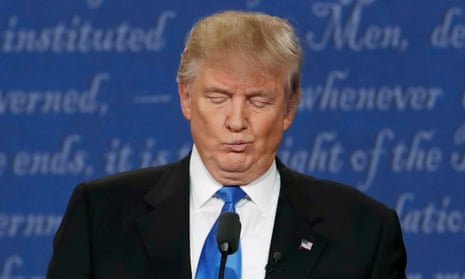Donald Trump walked on to the biggest stage of his life with nothing but upside ahead.
After the most undisciplined campaign in living memory, Trump was always going to look bigger by standing on a presidential debate stage. He could spar with a former secretary of state on an equal footing.
To paraphrase George W Bush, Trump thrives on the soft bigotry of low expectations. All he had to do was avoid tripping over his shoelaces. Instead he somehow contrived to blow his biggest moment, and all the credibility accrued by steadily gaining ground in the polls over the last several weeks.
Just like his convention speech, Trump ran a gamut of emotions from angry to aggravated. He sniffed and he snorted. He took every piece of bait Clinton dangled out there – from sideswipes about his father’s business to his support for the war in Iraq.
He sounded more like a heckler at a Clinton speech than a presidential candidate asking for votes. And he often seemed to resemble the rivals he once liked to mock. Just like Marco Rubio, he sipped water early and frequently. Just like Mitt Romney, he choked.
They say that presidential campaigns are the longest job interviews in the world. But judging from their first debate, it’s not clear that Trump and Clinton are interviewing for the same job.
Donald Trump appears to want a position on a conservative cable TV show, or possibly on a live blog of his own life. Pressed by moderator Lester Holt on his initial support for the war in Iraq, Trump explained that he had “very lightly” supported the war in an interview with Howard Stern. Or as he put it, “Who knows?” Then he detailed several conversations with Sean Hannity, a Fox News host who has recently taped a TV commercial on his behalf. But apparently “nobody wants to call him” which is a shame because Sean could totally clear this whole thing up.
In any case, as the GOP nominee put it, he’s just a lot better at this whole president thing than Hillary Clinton. At least, that’s what it sounded like. The following comes from the transcript, which captures the moment in all its unfathomable detail.
“I have better judgment than she does,” Trump said. “There’s no question about that. I also have a much better temperament than she has, you know? I have a much better – she spent – let me tell you – she spent hundreds of millions of dollars on an advertising – you know, they get Madison Avenue into a room, they put names – oh, temperament, let’s go after – I think my strongest asset, maybe by far, is my temperament. I have a winning temperament. I know how to win. She does not have a...”
This is the kind of stream of consciousness that does not reassure psychoanalysts, campaign strategists, or grammar teachers.
“Whew, OK,” said Clinton, when Trump’s rambling came to an abrupt end. She pretended to loosen her shoulders but frankly the rest of the world remains in need of a deep tissue massage.
For her part, Clinton appeared to be interviewing for something like commander-in-chief. When Trump once again suggested he would only defend allies if they paid him for the privilege, Clinton turned to the camera to address a fearful planet.
“I know that this campaign has caused some questioning and some worries on the part of many leaders across the globe,” she said. “I’ve talked with a number of them. But I want to, on behalf of myself and I think on behalf of a majority of the American people say that, you know, our word is good.”
Trump, by the way, has also talked to world leaders. “I met with Bibi Netanyahu,” he explained. “He’s not a happy camper.”
It would be wrong to say that Trump had no good moments in this first encounter. He voiced popular dismay with manufacturing job losses and politicians in general. He conceded that people on the no-fly list of terrorist suspects should not be able to purchase guns, and he reminded voters that his opponent had talked of some criminals as “super-predators”.
But then the debate turned to the pesky question of his obsession with Barack Obama’s birthplace, years after the White House released the full birth certificate. And Trump lost the plot, as well as his intended audience.
Clinton cast what she called “the whole racist birther lie” as part of a pattern stretching back to his early career in real estate when he was sued for racial discrimination. Trump’s response was to blame Clinton for the birther debate, before insisting that he was just one of many developers sued for discrimination. Besides, he bragged, he developed property in Palm Beach, Florida, that could prove his bona fides on race. “I opened a club and really got great credit for it,” he said. “No discrimination against African Americans, against Muslims, against anybody.”
It was widely reported that Trump did not prepare for this evening season with policy briefings or mock sessions with aides. Instead he clearly prepped for the big night by reviewing his own LinkedIn profile.
This was clearly no ordinary debate. That was obvious from the outset, when the candidates’ families and friends walked out as bold-face names: Bill Clinton, Ivanka Trump, Mark Cuban and Vernon Jordan. The audience cheered and hollered, clapped and booed, unlike the normally tightly controlled presidential debates of contests gone by.
In any ordinary election year, by any rational measure, you would say that Hillary Clinton trounced Donald Trump in their first debate. She was in command of her facts and her soundbites; he could only cite numbers about his own cash-to-debt ratio. She controlled the pace of the debate; he could barely control his temper. She talked about how she wanted to govern; he talked about her inferior stamina. The more important question is whether the majority of voters in November are in anything like a rational mood.
This may be a year when rational Americans stay at home, disillusioned with the spectacle of two older politicians squabbling over emails and tax returns. If Trump is right, voters are mad as hell and aren’t going to take this any more. In which case, they have found a candidate who demonstrated he’s just as mad as they are.

